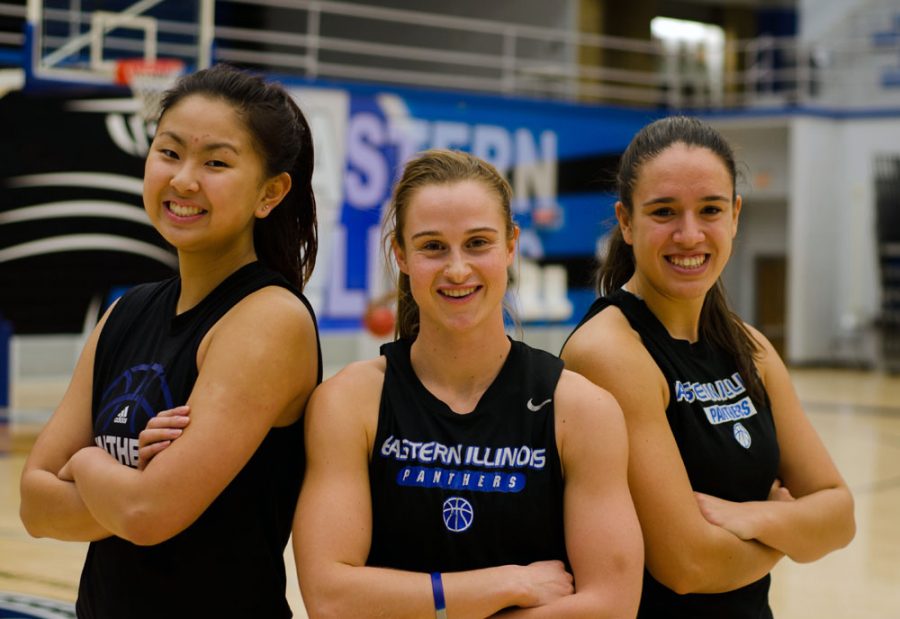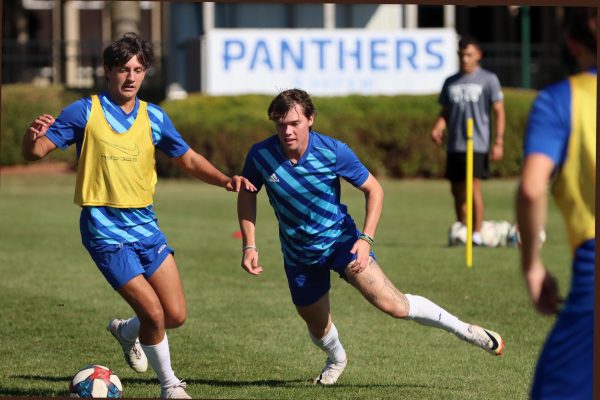Foreign athletes celebrate Christmas differently
Karina Chandra (left) from Brisbane, Australia; Grace Lennox (center) from Tasmania, Australia; Carmen Tellez (right) from Madrid, Spain. With only four days off during Christmas break, the athletes cannot all return home for the holidays.
December 11, 2016
For several foreign athletes in winter sports at Eastern, whether they are from Germany, Africa or Australia, one thing is for certain: they will be missing their families overseas.
The men’s and women’s basketball teams, for example, get four to five days off when they can celebrate Christmas with teammates or family who live in the United States.
For Aboubacar Diallo, a sophomore from Africa, spending time away from basketball for a couple days and spending time with family will be a good break.
“I’m going back to Oklahoma to see my house family,” Diallo said. “It’s good for me to go there because it’s not about playing basketball, it’s about family and love. They love me as a person, not as a basketball player.”
When Diallo lived in Africa, he and his family celebrated Christmas much like people in the U.S. do.
Diallo’s teammate Muusa Dama, was also raised in Africa, but celebrated Christmas differently, and was exposed to many different kinds of Christmas traditions and cultures.
“In Africa, I grew up around a lot of missionaries,” Dama said. “So I was surrounded by different cultures all at the same time. So, everybody brings their cultures together, like, Americans, Norwegians and Europeans, and we just all get together and celebrate.”
Dama has also celebrated Christmas in California with his grandparents, and that was a completely different experience than what he was used to.
“I’ve had a Christmas in California, and that was weird to me, because they have a parade, and that was different from what Christmas is like in Africa,” Dama said.
Grace Lennox, a junior on the women’s basketball team, said Christmas is the hardest time of the year for her because she cannot spend it with her family.
“We have four days off for Christmas, so I’m just going to go stay with a friend,” Lennox said. “Our season runs over Christmas, so we don’t have the time to go home.”
In Australia, where Lennox and her teammate Karina Chandra are from, Christmas falls in their summer season, and, rather than dreaming of a white Christmas, they dream of good times at the beach spent with family.
Although Lennox said she will spend her four-day Christmas break with a friend here in the States, Christmas is not the same here as her Christmas back home.
“Christmas at home is a lot different than it is here because it’s summer there,” Lennox said. “So, instead of snuggling up inside with your family, we have a barbeque outside or a big Christmas dinner. And then after that we would play cricket and then go to the beach.”
Unlike the men’s and women’s basketball teams, two track athletes from Germany will be fortunate enough to go back home for Christmas break, but it will not be easy to train in Germany for junior Lars Ott.
“I’m from the countryside, so it will be harder for me to find a place to run with no snow,” Ott said.
Luckily for his teammate, freshman Louisa Rieger, facilities are much easier to find.
“It will be very easy for me to train in Germany because I will just go back to my old group,” Rieger said. “They are looking forward to me coming back.”
Just as their families are looking forward to seeing them, Rieger and Ott both said that seeing family who they only get to see at Christmas is what they are mostly excited for, along with the German Christmas traditions that are not celebrated in the United States.
“In Germany, on the 6th of December, a man named Nicholas comes into the house and leaves small presents in your boot,” Rieger said. “And people here in the United States don’t celebrate that, because I did that for my roommate this morning and she was like, ‘what is going on, why is there chocolate and oranges in my boots?”’
Adding to Rieger’s tradition of celebrating St. Nicholas, where Ott is from in Germany there is a tradition that involves putting on costumes to scare children who were put on the naughty list.
“There’s a tradition we have, where I’m from in Germany, when the girls dress up as evil spirits on December the 4th, and on December the 5th the men dress up in their costumes,” Ott said. “I’m not sure where that tradition is from, but they dress up as evil spirits to scare or punish the bad kids. On December the 6th, Nicholas brings treats for the well-behaved children’s shoes, or Krampus comes for the bad children; this is called Klausentreiben.”
Maria Baldwin can be reached at 581-2812 or [email protected].




















































